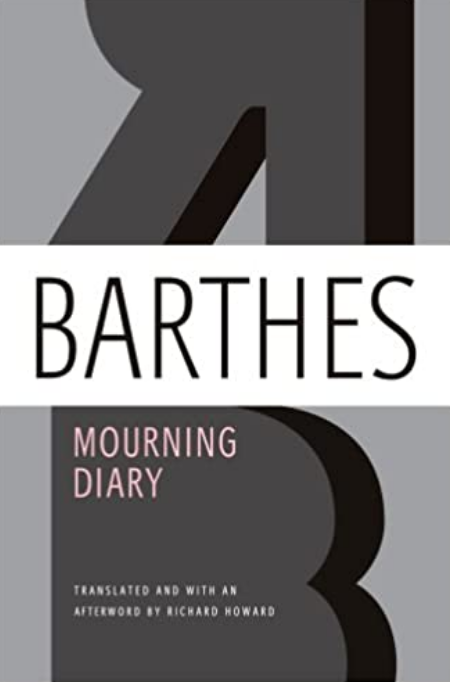Learning to Grieve: Through the Tunnel, with Barthes’ Mourning Diary
By Arpita Das
Joan Didion writes that grieving is an experience, but mourning is work, and she could not have said it better. Grieving is certainly something one goes through, one experiences, one gives in to, one has to submit to when one experiences loss — be it the loss of a loved one to death, the end of a relationship, even the shattering of an illusion that had kept one going. But mourning is the work that one has to do to get through this vital time in one’s life. It’s about making sense of a time that feels chaotic and difficult to make sense of; it has also to do with not allowing oneself to become inured to pain because of its overwhelming ferocity, to remain humane, if you like. But more than all of that, mourning has to do with surviving a time of loss and the grief that overcomes one and emerging from the experience with whatever one considers one’s ‘faith’ more or less intact.
ALSO READ: COVID-19 and You: Grief, Mental Health and Julian Barnes
There is a reason why people say of those who have not paused to allow the fact of loss and grief to sink in, ‘it is a pity that they haven’t mourned’. For there is no moving past loss or grief without the mourning that one must commit oneself to. But what does the act of mourning look like, feel like? Is it about memorialising or just privately remembering; is it about delving deep into one’s recesses to mine how a person or situation or idea felt when it was alive or is it just about helplessly and cathartically weeping?
Sigmund Freud characterised the flesh and bones of mourning as: ‘…loss of interest in the outside world, loss of capacity to adopt any new object of love, turning from every effort that is not connected with thoughts of the dead’.¹
ALSO READ: YOUR STORIES
What then does mourning accomplish? Why is it the expected ‘expression’ of grief? The task of ‘mourning’, writes Freud, is to accomplish the process of ‘detachment’, and it can astonishingly only be performed by dredging up every iota of memory or sensation which is associated with that which/who has been lost. Freud writes that when the ‘absorbing work’ of mourning is completed ‘the ego becomes free and uninhibited again’, a line that makes up in accuracy what it plays down in the hard work of the act it is describing, the sheer paroxysm of pain that one must subject oneself to in order to come out on the other side of the tunnel. There is no escaping it.
Throughout the aftermath of my father’s death three years ago, my own mourning period, I found that I observed myself minutely, like in one of those mirrors in the hotel bathrooms which men use to shave; I watched myself, and I read and I wrote. And in that process lay an ode to a book I had chanced upon a few years ago when writing an article on writers’ journals, Roland Barthes’ Mourning Diary. Barthes began to write it the day after his mother’s death in October 1977. For nearly two years after, the celebrated French writer captured in this unusual journal his desolation, his loneliness, and his inability to stop thinking about his beloved ‘Maman’.

In effect, he created a treatise for the act of mourning, an act that has its own plodding stride, even as he recorded how he kept step with life during this time through his writing. What unnerves the reader who fears opening up about her innermost fears, and equally disarms the reader who welcomes such openness, is Barthes’ unfettered vulnerability in the diary, at times utterly unfashioned by any literary sophistication, naked, there for all to see and partake of.
His diary entries are short, at times, just a line per day, sometimes, something of a tidy vignette, as if expressing what he felt gave rise to an ache that was difficult to bear. At times, he calls out to Maman, beseeching her to come back to him, to help him, like a little child seeking his mother. At other times, there is steel in his tone, even as he must get on with the business of the day. And on yet other days, he allows himself to succumb to his memories and the agony and release they bring with them.
Five days after his mother’s death, Barthes writes,
‘Part of me keeps a sort of despairing vigil; and at the same time another part struggles to put my most trivial affairs into some kind of order. I experience this as a sickness.’
Often, loss brings clarity to one’s perception of what is genuine and what fraudulent; this new alertness, I found when I lost my father, was strongest in the first couple of weeks that followed the event. It is like having superhero-like powers in seeing through the masks that people wear, and not just for people you know well, or acquaintances who visit to express their condolences, but perfect strangers on the street. Barthes captures this luminously when he writes,
‘A strange new acuity, seeing (in the street) people’s ugliness or their beauty.’
After the immediate aftermath is over, usually marked in every culture by all the ritualistic observances that keep you busy for a couple of weeks after the event, the mourner feels the pressure to show that ‘they can now handle it’. It is at such a moment that one feels perhaps most desolate. The falseness of normalcy which is made contingent by our ‘modern’, ‘productive’ existence that does not allow us to slow down is what makes the unbearableness of it spill over.
Barthes writes of this,
‘Indeterminacy of the senses: one could just as well say that I have no feelings or that I’m given over to a sort of external, feminine (“superficial”) emotivity, contrary to the serious image of “true” grief—or else that I’m deeply hopeless, struggling to hide it, not to darken everything around me, but at certain moments not able to stand it any longer and “collapsing”.’
He writes of the need to withdraw from society for fear of having no control on how despair might suddenly take hold of you:
‘And little by little I cease struggling. I withdraw, without any concern for how I appear to the others. Thus it begins by an initially slight disaffection for sociability which becomes radical. As it develops, it gradually combines with a nostalgia for what remains living for me: maman. And ultimately, I fall into an abyss of suffering.’
But the most powerful line for me in this book was the one that led to the realisation that there is hardly ever any template to ‘mourning’, that everyone’s process is their own, and all you can do, the best you can do, is muddle through it. Indeed, Barthes writes with determination,
‘I know now that my mourning will be chaotic.’
I read that line innumerable times during my own mourning, to remind myself that this unbearable state of heart tied me to the entire human race just like love and happiness and truth. Barthes writes further,
‘Explained to AC, in a monologue, how my distress is chaotic, erratic, whereby it resists the accepted—and psychoanalytic—notion of a mourning subject to time, becoming dialectical, wearing out, “adapting”. Initially this mourning of mine has taken nothing away—on the other hand, it doesn’t wear out in the slightest.’
I found one way in which I mourned my father was through objects that once belonged to him. I started wearing the watch he had worn over the last few years of his life. His dark glasses too. And I began to carry the bag in which he had taken his papers to work every day. In the bag among his papers and files and stationery, were a comb with a few strands of his hair still caught in the teeth, a file with cuttings of articles I had written, and a photo of my kids. I wept for an hour with these articles before me before carefully stowing them in a drawer in my desk, taking care that not a single strand of hair should fall free from the teeth of the comb.
Barthes writes of the pain that encountering the everyday objects valued or used by the lost one causes,
‘Afternoon with Michel, sorting maman’s belongings.
Began the day by looking at her photographs.
A cruel mourning begins again (but had never ended).
To begin again without resting. Sisyphus.’
And yet, as many of us who have gone through the mourning steps know, when the griever is ready to sort through the lost one’s belongings, they are exhibiting a vital sign of beginning to move towards the place where the process of mourning finally carries you, of accepting the situation in all its painful reality and moving on. I knew this when my mother called me one day months after my father’s death saying she wanted to donate some of my father’s clothes to the Mother Teresa Old Age Home in North Delhi. I knew it instinctively, and also because I had read this notation in Barthes’ Diary a few days before that,
‘We feel the need to create a sort of harmony between what the dear departed has been and what is offered after that being’s death: maman buried at Urt, her grave, and her belongings in the rue de l’Avre.’
Indeed, recovery is also an inevitable human condition, particularly when it is a matter of spirit. Ever so steadily, Barthes begins to identify that his chosen path, his writing, is also to be his solace in this time of despair. He writes,
‘Confusion, defection, apathy: only, in snatches, the image of writing as “something desirable”, haven, “salvation”, hope, in short “love”, joy. I imagine a sincerely devout woman has the same impulses toward her “God”.’
At times, the work annoys him too, since it intrudes upon his mourning,
‘Everything began all over again immediately: arrival of manuscripts, requests, people’s stories, each person mercilessly pushing ahead his own little demand (for love, for gratitude): no sooner has she departed than the world deafens me with its continuance.’
But as my dear friend who is a psychotherapist explained to me when I exhibited my own brand of annoyance at people beginning to crowd into my carefully constructed mourning arena, the annoyance itself was a sign of my own ‘continuance’, a proof of life, as it were.
At some point, a peace of some kind, a feeling of revival, and of having come to terms returns, which is tremulous at times, powerful and resigned at others. Nothing describes this fragile serenity better than the extract from a letter written by one of the greatest French writers of all time, (Marcel) Proust, on his own mother’s death, which Barthes reproduces in his diary.
‘…you will often think of days past when you had her. When you are used to this horrible thing that they will forever be cast into the past, then you will gently feel her revive, returning to take her place, beside you. At the present time, this is not yet possible. Let yourself be inert, wait till the incomprehensible power that has broken you restores you a little.’
I remember this line often as I look at the trees that line the roads of Delhi when I am in a cab going somewhere. Because when I look up at those trees, trees that my father loved and often pointed out to us as he drove us through the city he grew up in, I feel my father’s presence by my side. It is as if finally, I too have been granted the serenity Barthes spoke of.

Sources:
1. Freud, S. (1917). Mourning and Melancholia. The Standard Edition of the Complete Psychological Works of Sigmund Freud, Volume XIV (1914-1916): On the History of the Psycho-Analytic Movement, Papers on Metapsychology and Other Works, 237-258
Disclaimer: Views expressed are personal
About the Author: Arpita Das runs the award-winning indie publishing house, Yoda Press. She conducts writing, editing and publishing workshops regularly under the Yoda Press Workshops Series and writes for various platforms and periodicals on book culture, publishing, bibliotherapy, gender and popular culture. You can find her on:
Twitter @arpitayodapress | Insta | Linkedin
Feature Image by Rawpixel



